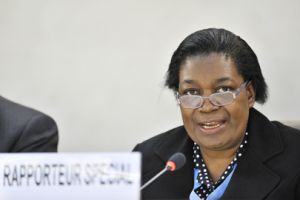UNITED NATIONS, Oct 26, 2011 (IPS) - A chair stood empty at the launch here Monday of a report on the repression of human rights defenders, a physical reminder that its would-be occupant - Ales Bialiatski, president of Human Rights Centre Viasna in Belarus – has been languishing in prison since August.
A three-time nominee for the Nobel Peace Prize, Bialiatski is charged with tax evasion, but supporters say it is clear that the charges are in retaliation for his long and distinguished career of human rights activism in the country.
The chair was also empty for the hundreds of other human rights defenders across the world who have been deprived of their freedom and fundamental rights, leaving a void in the communities they worked to protect.
The Observatory for the Protection of Human Rights Defenders is a joint programme by the International Federation for Human Rights (FIDH) and the World Organisation against Torture (OMCT).
Its aim is to prevent or remedy crackdowns on human rights defenders through actions such as legal assistance on the ground and by issuing an alert mechanism to mobilise intervention by the international community.
The over 600-page report details examples of individual human rights defenders and organisations that faced repression between January 2010 and April 2011. It covers 70 countries in Sub-Saharan Africa, North Africa, the Middle East, Asia, The Americas and Europe.
The abuses cited include attacks and harassment, threats and arrests, arbitrary detention, defamation campaigns, and restrictions in terms of freedoms of association and expression.
The report is based on information OMCT and FIDH received from their members, human rights organisations around the world, who in turn have contact with 400 independent domestic organisations on the ground.
Antoine Bernard, the chief executive officer of FIDH, told IPS that the Observatory's report doesn't "pretend to be exhaustive", but rather highlights broad trends that emerge from the cases FIDH and OMCT have worked on during the year.
"The major trend this year relates to the criminalisation of social protests," he said. "That is a very universal trend, to use the law not as a protecting tool, that is supposed to be its role, but law as a repressive tool to arbitrarily provide the legal basis for silencing human rights defenders."
He also cited ongoing impunity for these repressive tactics as a universal trend.
With the launch of the report, Bernard said that FIDH and OMCT call on governments to meet their responsibility to protect human rights defenders, as well as on other non-state actors, and to strengthen international support mechanisms.
The United Nations special rapporteur on the situation for human rights defenders, Margaret Sekaggaya, underscored the importance of implementing the Declaration for Human Rights Defenders that the General Assembly adopted back in 1998, and the importance of disseminating information about it.
The declaration is not legally binding in itself, but articulates rights laid out in other legally binding treaties, in a way that makes it easier to apply these rights to the context of human rights defenders' situation. For example, it mentions the right to access funding, which is something that many countries have put restrictions on.
"It is still an instrument that is not sufficiently known, either to those who should shoulder the main responsibility for its implementation, namely states, or to those whose rights it sets out to protect, human rights defenders," Sekaggaya said.
But of course, it is not always in governments' interests to implement and disseminate this information, she added, makes the task very difficult.
The example of Syria
More than 3,000 Syrians are believed to have been killed since pro- democracy protests erupted in March this year, but the figure could be much higher. Many international organisations have condemned the Syrian government's brutality against the protesters.
Earlier this month, the U.N. Security Council failed to adopt a Western-sponsored draft resolution that strongly condemned the Syrian government's violent crackdown, when Russia and China vetoed it.
"The number of the people who have been detained nobody knows exactly, we have an estimated number that more than 30,000 have been detained," said Dr. Radwan Ziadeh, the executive director of the Washington-based Syrian Center for Political and Strategic Studies and director of the Damascus Centre for Human Rights studies in Syria, who attended the launch.
Since the revolution started, Ziadeh and his organisation have been in contact with a network of activists in Syria who have reported on the situation from underground, because they don't have the regime's permission to operate legally.
He said authorities have taken family members hostage to send a message to human rights activists. Ziadeh's brother is in prison because of Ziadeh's efforts to promote human rights, as well as an uncle and three of his cousins, one of them just 14 years old. They have all been detained, and he has no information about them, he told the audience with a voice that quavered with emotion.
"The Syrian regime actually cancelled the football championship because they turned over all the soccer fields to be detention centres and torture centres... It's almost like the Nazi regime practices, having thousands of thousands of political prisoners in detention centres," Ziadeh said.
"This is why any delay of the actions of the Security Council unfortunately makes the situation much more difficult, and much more open to options none of the Syrians like to have in Syria, like civil war," he added.
FIDH consists of 164 member human rights organisations around the world and OMCT is a coalition of international non-governmental organisations that "fight against torture, summary execution, enforced disappearances and other cruel, inhuman or degrading treatment".
"A threat to a human rights defender very often transcends beyond the individual case, it carries a shadow to society at large," concluded Gerald Staberock, secreterary-general of OMCT.
And this leaves the world with far too many empty chairs.

No comments:
Post a Comment